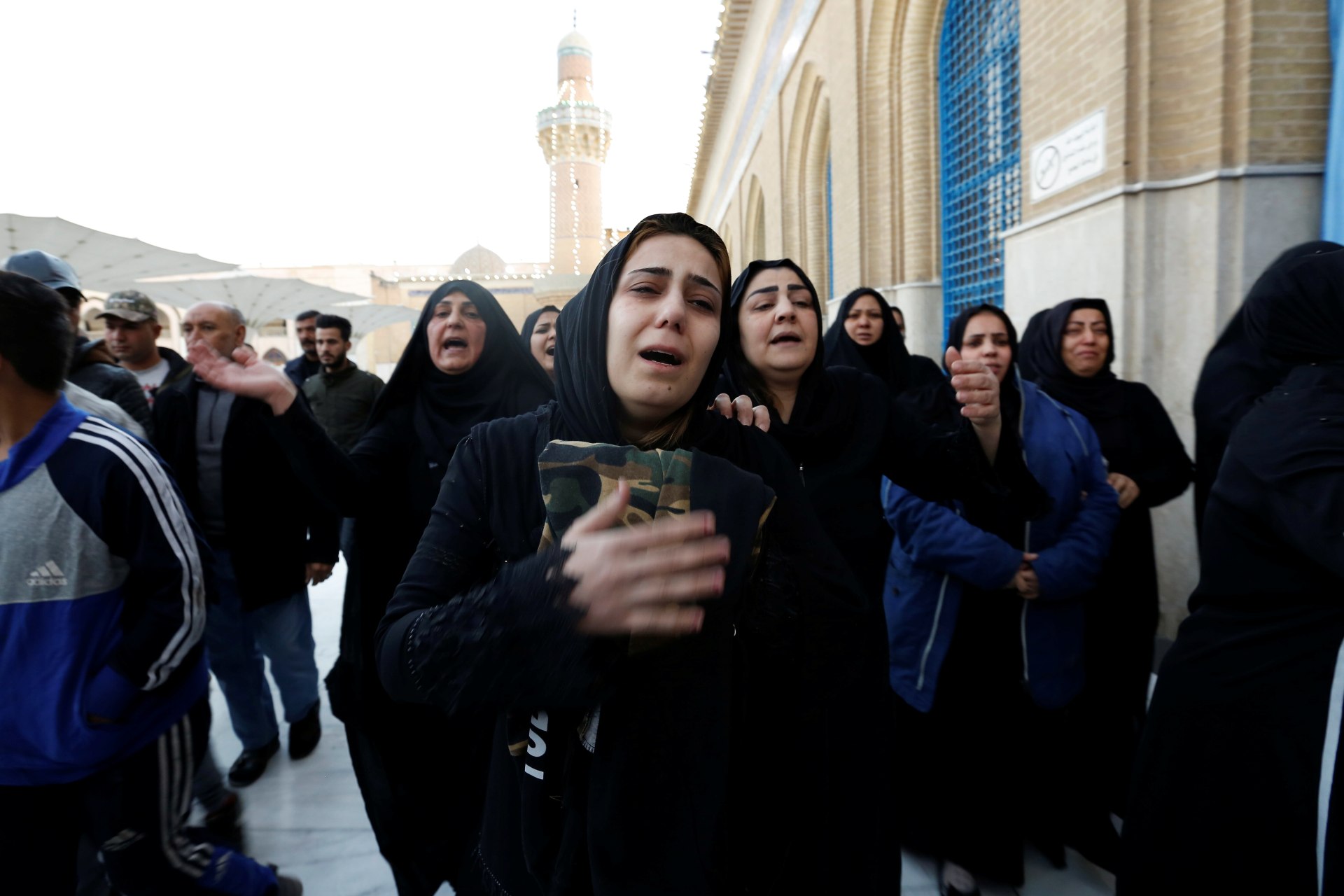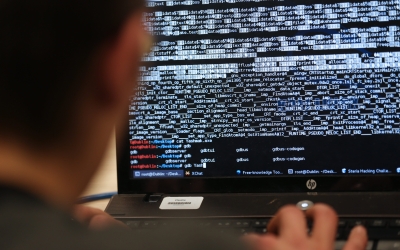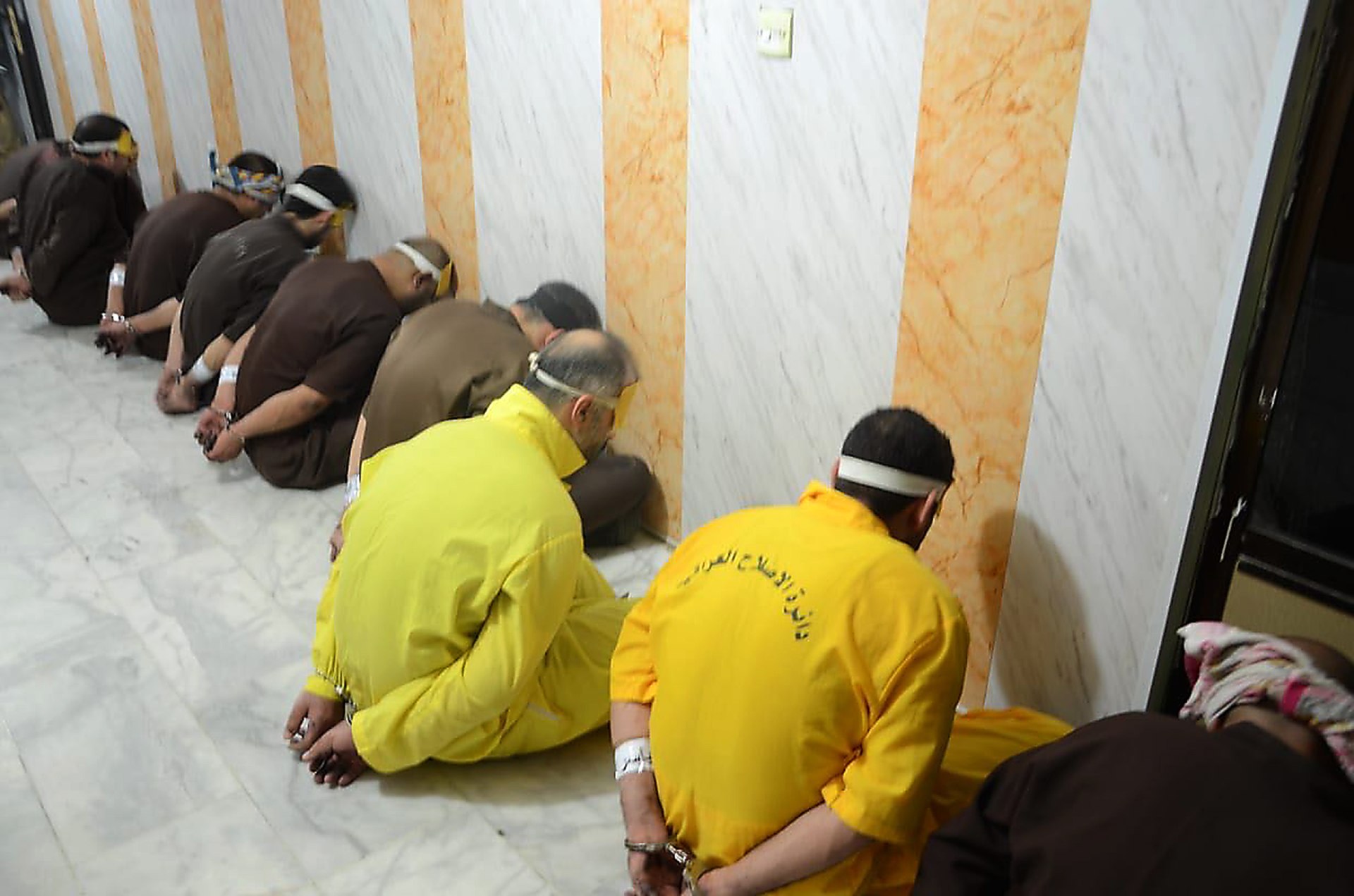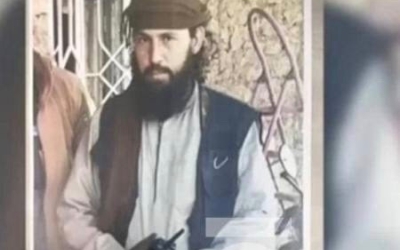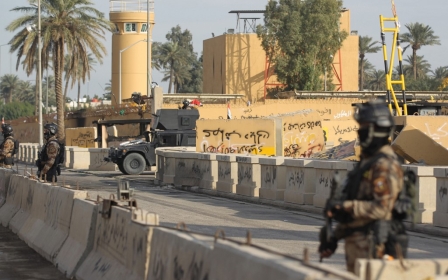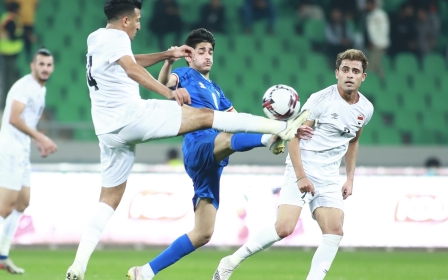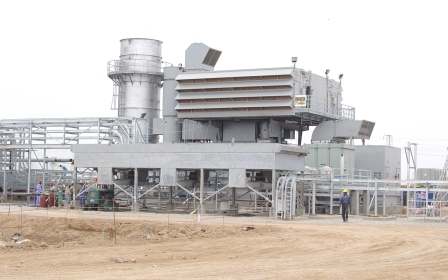REVEALED: How Kadhimi seized power by accusing Iraq’s spymaster of foreign loyalties

Two weeks ago, the Falcons Cell was one of the Iranian-backed factions’ most-prized assets in Iraq.
The elite intelligence unit, hailed as Iraq’s “most dangerous” spy network, is CIA and MI6 trained. It boasts hundreds of successful operations against militant operatives, and rivals all other Iraqi intelligence services in its scope and prowess.
Yet in one swoop, Prime Minister Mustafa al-Kadhimi has changed its leadership and snatched this prize from his Shia rivals, securing for himself an organisation that gives him knowledge and power that his political enemies will find deeply troubling.
By any measure, it is a coup for Iraq’s embattled prime minister.
Since taking office in May, the former intelligence chief has struggled to control his country’s various security and military agencies, most of which are under the control of political and armed factions backed by Iran.
The Falcons Cell, which is affiliated with the interior ministry’s Federal Intelligence and Investigations Agency, has training and equipment that are among the region’s finest.
Taking control of it means Kadhimi now oversees the second-most effective government spying system operating in Iraq, whose human and technical resources have been exploited occasionally to target and terminate political rivals and civilians over recent years, security officials and politicians told Middle East Eye.
The reshuffle was born out of tragedy. On 21 January, two suicide bombers blew themselves up in Tayaran Square in central Baghdad, killing 32 civilians and wounding 110 others. Less than 24 hours later, the Islamic State group (IS) claimed responsibility.
Outrage and a demand for accountability followed the first terror attack in the capital for years.
Intelligence indicated more attacks were planned in Baghdad, but also in Basra and other Shia-majority cities.
Kadhimi, as commander-in-chief of the armed forces, appeared to act swiftly to mitigate the damage and address the security breaches by dismissing five senior federal security and military commanders.
Among them was Abdul Karim Abd Fadhil. Known as Abu Ali al-Basri, or the “master of spies” as his comrades like to call him, he was the director of the Falcons Cell and one of its co-founders.
Of all the dismissals, Basri’s came as the biggest shock. Kadhimi’s allies and opponents alike saw his sacking as humiliating and unexpected. They told MEE it appeared the prime minister was settling scores, using the Tayaran Square bombing to get rid of a man most Shia politicians consider successful and non-political.
Yet this characterisation is far from the image Kadhimi himself presented when he laid out his reasons to the National Security Council hours after Tuesday’s attack.
"Kadhimi said clearly that the intelligence services of foreign countries know what Basri is doing, but the Iraqi government has no idea what Basri is doing,” a member of the council told MEE, speaking on condition of anonymity.
'Kadhimi said clearly that the intelligence services of foreign countries know what Basri is doing, but the Iraqi government has no idea what Basri is doing'
- Member of the Ministerial Council for National Security
The source said Basri never submitted his reports to the current interior minister nor the deputy interior minister for intelligence, who are supposed to be directly responsible for him, and the two had a negative evaluation of his work.
"Kadhimi said the Iraqi intelligence service was monitoring the movements of a foreign intelligence officer and found that Basri was meeting with him,” the source added.
Middle East Eye asked Kadhimi’s official military spokesperson, Major General Yahya Rasul, for comment but received no reply.
Basri, meanwhile, insisted all his and his men’s activities with foreign agents - be that the US-led coalition fighting IS or representatives of embassies - were carried out with the full knowledge of the government.
In fact, Basri denied that Kadhimi would even accuse him of collaborating with a foreign intelligence operative.
"It is unlikely that Kadhimi would say this. No way," he told MEE.
“I did not work for anyone but Iraq. I thwarted hundreds of car bombs and suicide bombers, which means I delighted thousands of children by protecting their parents. I also protected hundreds of our daughters at the universities who were subject to blackmail online,” he added.
"I do not have any interviews with any international party without the knowledge of the Iraqi government."
Emerging from chaos
The Falcon Cell’s unique status and abilities emerged from the chaos of 2009 Iraq.
Back then, the security situation was continuously deteriorating. Al-Qaeda and various armed groups carried out deadly attacks in and around Baghdad almost daily, often killing dozens at a time.
Iraq’s security services were totally overwhelmed. Burdened with financial and administrative corruption, sectarian and political divisions, and lack of experience, they remained several steps behind the militants they pursued.
They were also infiltrated by Sunni and Shia armed groups, security commanders who served at the time recalled to MEE.
"They [the armed groups] knew everything about us. Our officers' names, their ranks, their vehicle numbers, their addresses, their duties, their equipment, and even the timing of changing shifts. Because they knew all the details related to security duties, targets and everything else, they always kept ahead of us,” a senior federal police officer said.
"We were not only losing the targets we were seeking to reach, actually we were losing our officers and soldiers. They were sniping them one after the other, and we did not know how to stop this bleeding.”
The various security agencies attempted to come up with solutions and limit the leakage, which was exacerbated by the multitude of security and judicial agencies involved in every operation.
Though many ideas were raised, none passed the first hurdle until 2011, when then-prime minister Nouri al-Maliki, who is widely regarded as having an “intelligence mentality”, decided to create a secret intelligence organisation with wide executive powers that allow it to pursue suspects, investigate, arrest or terminate without referring to any other security or judicial body.
This organisation was later called the Falcons Cell.
“We used to call it the Special Operations Agency attached to the Intelligence Directorate at the Ministry of Interior,” said a senior security official familiar with the unit’s work from the beginning.
"The Falcons Cell is like an executive body that provides a VIP service.”
Elite unit
Throughout Maliki’s second term in the premiership, he kept the Falcons Cell far from the reach of his security ministers. Instead, he personally appointed his old friend and comrade in the Islamic Dawa Party, Abu Ali al-Basri to be the head of the unit.
Basri, known for his calmness, modesty and lack of inclination for limelight and gatherings, was one of 12 Iraqi officials who established the cell, in cooperation with the American and British intelligence agencies.
At first it numbered between 100 to 160 men. But by 2021 that swelled to 1,800, according to a top security official - around 10 percent of the Intelligence and Federal Investigations Agency it is part of.
'The Falcons Cell has equipment, expertise and a network of sources that have placed in their hands many files that could destroy any figure or political or armed force in the country'
- Former security official
The cell has a special budget, a special judge, and a special detention facility located at al-Muthanna Military Airport in central Baghdad.
Most importantly, its tasks and structure are a closely guarded secret, and it possesses the latest espionage, surveillance and monitoring techniques. No other Iraqi security apparatus surpasses it in this field, except for the intelligence service that Kadhimi once led.
“The Falcons Cell is one of the most important and dangerous intelligence agencies in the country,” said a former security official, who used to supervise the unit’s performance.
"It is an elite organisation specialised in combating terrorism and organised crime for 10 years. And they have equipment, expertise and a network of sources that have placed in their hands many files that could destroy any figure or political or armed force in the country."
Growing success
Only a few heard of the Falcons Cell for its first four years.
The unit’s tasks are secret and limited to combating terrorism and the Sunni armed groups involved in this file, and the cell’s direct association with Maliki’s office added to the ambiguity.
A senior security official at the interior ministry remembers the disconnect between the Falcons Cell and the rest of the agencies.
"Basri was not reporting to us. Sometimes we heard the deputy interior minister for intelligence affairs saying ‘We will carry out a major operation this week’ or ‘We carried out a major operation last week’ without revealing any details," he told MEE.
"Everyone knows that they were focusing on al-Qaeda, and IS later on, and this was not part of our daily work in the ministry.”
The Falcons Cell’s name began to circulate during the rise of the Islamic State group. In February 2014, it was first mentioned in the media, when the interior ministry revealed it had thwarted a suicide attack on the juvenile prison in Tobji, west of Baghdad.
The cell’s second media appearance was 10 months later when it was credited with obtaining intelligence that led to an air strike that killed 14 militants close to then-IS leader Abu Bakr al-Baghdadi. Baghdadi himself was wounded in the attack.
Over the following years, the Falcons Cell was credited again and again for its part in such operations. According to official data, dozens of IS fighters and leaders have been terminated by the unit, or thanks to information it provided.
Out of Iran’s hands
When the cell was formed, its elements were carefully chosen.
Many security and political leaders told MEE that the majority of the cell’s officers are Shias loyal to Maliki and Hadi al-Ameri, the leader of powerful Shia paramilitary the Badr Organisation, as well as a number of other Iranian-backed leaders.
But none of these officers were allowed to clearly demonstrate these loyalties to ensure continued support by western forces, and Iran itself has not "publicly" provided any kind of logistical or technical support to the cell over the years, security officials told MEE.
"The cell was formed in cooperation with the American and British intelligence agencies, and they insisted on nominating the Falcons Cell officers exclusively for the training courses they provided for the interior ministry,” a security official familiar with the work of the unit told MEE.
"This matter irritated us, as they did not let us nominate officers from the other security directorates for these courses, and we often clashed with [US and British commanders] because of this. But these courses were high quality and important, and could not be dispensed with.”
The CIA and MI6 were thorough in their vetting. The agencies conducted deep investigations, refusing to accept anyone with the slightest link to Iran or Iranian-backed armed factions - even if a nominee had visited the country for religious or medical reasons.
The question, many have wondered, was whether this was enough to keep Tehran’s long reach out of the Falcons Cell.
Theoretically, the unit’s hands were clean. But in practice, the Falcons Cell never pursued any of Iraq’s Shia armed factions, especially those linked to Iran. Cooperating with the Iranian-backed factions is also one of the charges against Basri, the member of the National Security Council told MEE.
"The cell is the most dangerous tool that can be used to dismantle the factions because it knows everything about them. But it did not work against them and therefore they did not classify it as their enemy,” a senior security official told MEE.
"The cell did not work against the factions, and it also did not work for the factions. Basri did not work with them [the factions], but this does not mean that he does not leak some information to them from time to time, or cover their tracks.”
Political tool
Facts on the ground and sources suggest Iran has access to the cell’s officers and resources, despite no clear links.
It is notable that as well as dismissing Basri, Kadhimi ordered the unit to be operationally re-linked to the commander-in-chief’s office, limit its activities to pursuing IS, and coordinate fully with the rest of the security services, officials said.
This indicates the cell’s involvement in tasks other than pursuing IS cells, as it was publicly mandated to do.
Two senior security officials, a former senior security official and two prominent Shia politicians told MEE that the Falcons Cell's human and technical resources were used to pursue activists in the October 2019 anti-government demonstrations, especially in the central and southern governorates.
They said some Falcons Cell officers cooperated with some Iranian-backed armed factions to arrest and extort a number of activists in Basra and Karbala.
'Kadhimi's opponents believe that the accumulation of all intelligence agencies into one hand represents a danger to everyone, so they attack him'
- Senior security official
A senior security official at the interior ministry said Maliki was "the first to use the cell against his political opponents," including Tariq al-Hashemi, a former vice president who was accused of involvement in terrorism cases and issued with an arrest warrant in December 2011. He was sentenced in absentia to death by hanging.
Similarly, it is alleged the unit targeted Rafi al-Issawi, the former finance minister, who has been sentenced in absentia to seven years imprisonment on corruption charges.
"Maliki previously used it to exclude his opponents, just as Adel [Abdul-Mahdi, the former prime minister] used it against the demonstrators. So what prevents Kadhimi from using it this time?” the official said.
The Falcons Cell is just one slice of Maliki’s legacy being fought over by political rivals since 2018, when Abdul-Mahdi's weak and short-lived premiership opened the door for rivals to jostle over Iraq’s various security and intelligence agencies.
According to the official, the Iran-backed Fatah alliance and influential Shia cleric Muqtada al-Sadr’s Sairoon bloc are in a fierce competition to seize as many levers of state power as they can.
Meanwhile, Kadhimi appears to be waiting for his chances and playing a tactical game.
"Kadhimi is here seeking to find areas that he can occupy as a prelude to consolidating his position ahead of the upcoming parliamentary elections,” the official said.
“But his opponents believe that the accumulation of all intelligence agencies into one hand represents a danger to everyone, so they attack him.”
Middle East Eye delivers independent and unrivalled coverage and analysis of the Middle East, North Africa and beyond. To learn more about republishing this content and the associated fees, please fill out this form. More about MEE can be found here.



